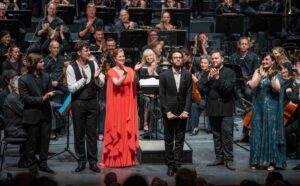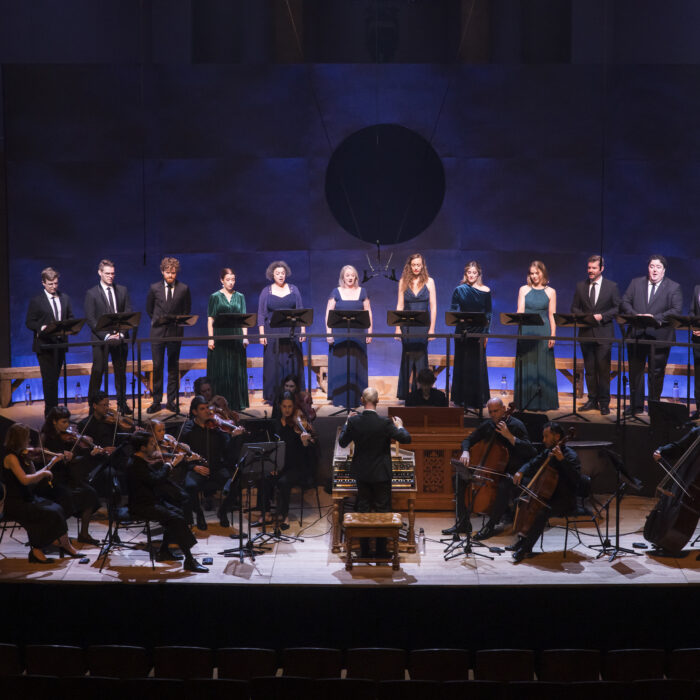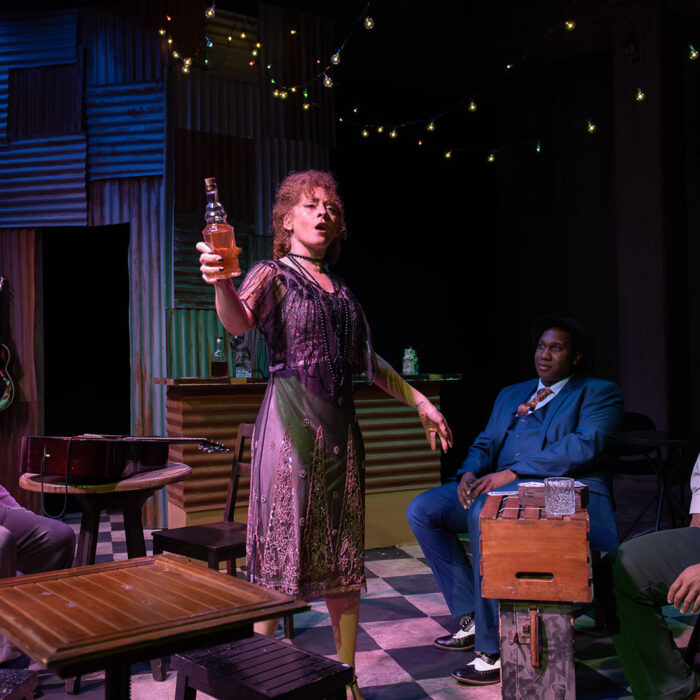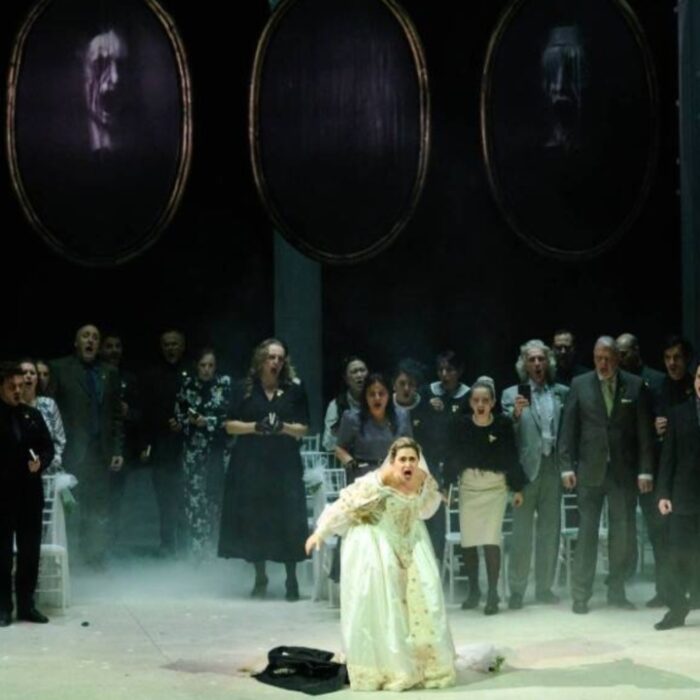
Salzburg Festival 2023 Review: Les Troyens
By João Marcos CopertinoPhoto: © Marco Borrelli
Berlioz’s “Les Troyens” is one of those operas that is larger than life. Arguably, two operas in one night. Everything sounds like the realization of romanticism’s epic promise and showcases the musicians’ talents overflowing in the hall.
It is hard to not expect a lot from a performance of Berlioz’s opera with a revolutionary and Romantique orchestra, and a more than promising cast. However the performance was, to an extent, compromised by the drama of Gardiner’s violent attack on a singer. Although such a striking absence, “Les Troyens,” had its qualities well-explored by conductor Dinis Sousa.
The opera was presented in a concert version, but there were very compelling scenic movements commanded by Tess Gibbs. The scenic movement was competent enough that the audience was unlikely to regret the absence of epic scenarios, such as a painting by David (something that no stage director is likely to be inclined to do nowadays).
To my ears, this production shone first and foremost because of the great sonority of the Monteverdi Choir and the Orchestre Révolutionnarie et Romantique. Dinis Sousa’s musical direction made all the difference. It is often assumed that historically informed musicians work with smaller and overly articulated sounds. Such a mistaken vision of Historically Informed Performances could not be sustained after seeing this Berlioz. The sound was huge, but respected that the epic opera can be epic only if all parts sound as epic as they should. It was respectful to all elements’ potential. In other words, it sounded like opera should sound.
Special Highlights of the Performance
A special highlight was the Monteverdi Choir—clearly the most impressive choir group that I have heard this season in Salzburg. The level of choral singing was extremely high throughout the festival. But it is noticeable that, on an acoustically friendly stage, the choir becomes an entity—a full-grown character that seems to unite all the other larger-than-life figures.
It must be hard to be Cassandra. The character is cursed always to know the future, but never to be trusted by anyone. Alice Coote negotiated yet another layer of difficulty inherent in Berlioz’s Cassandra: its massive vocal requirements verge on the colossal. The singer clearly has the charisma and the artistic personality for the role. Coote sang in extremely visceral French and put the role’s dramatic urgency in first place. Her voice does not have the beauty and warmth of the dramatic sopranos who sang the role. However, this Cassandra is tired of her suffering. She tries to be understood, but she is disbelieved until the end.
Lionel Lhote’s Chorébe was a perfect match to Coote’s Cassandra. His voice was less sonorous—can anyone be more impressive than Cassandra? But, still a charming, is this hopeful lover who makes us believe that the future holds something better than disgrace. By the end of the second act, it was evident that the last three acts would have to work pretty hard to surpass the dramatic intensity provided by Lhote, Coote, and the Chorus.
Michael Spyres’s Énée was below his usual standard. I had the privilege of attending more than a few performances by Spyres this year, always with great a deal of satisfaction. The (bari)tenor has a great voice and a scenic magnetism that is hard to explain. He is an okay actor, but his attractiveness on stage usually surpasses his thespian skills: he is just that interesting. His musicality has shown much improvement as well. His phrases are more and more complex and nuances more labored.
That said, this Énée was far from great. He was having some vocal issues in the first part. His high notes were opaque and mistuned. But, in the final acts it was evident that his bad night would last until the end. The singer’s voice sounded reduced: his high notes were less and less sustained, and his voice broke more than a few times. It happens in the best families. He still managed to do well in the fourth act’s love duo.
Interesting Insights
Paula Murrihy found unusual solutions singing Didon. Her voice is quite beautiful, but it has two different colors. In pianissimo, it is a warm and rounded voice. In forte, it gains a stridency and a vibrato that sounds opaque and sometimes pitchy. This is not to pinpoint any technical flaw, but to suggest how she engaged her character’s vulnerabilities and state obligations. It was as if two Didons were presented. One who could love and was uninterested in politics. Another who could reign, but at great costs to her personality. It was an interesting artistic solution—not necessarily my favorite, nevertheless.
Beth Taylor managed to sing the role of Didon’s sister Anna with a very dark color that still sounded youthful and well-humored. The low tonality of her instrument was a perfect contrast to the lighter tone of Murrihy. This was a nice touch in which the low mezzo abandons the witch and becomes the cool child on the block.
Adèle Charvet was the Cupid-like gamin Ascagne. Another singer whom I have seen more than a couple of times this season—always with a good impression—and still I was surprised. The ingenuity that she gave to the role through her modest and androgynous approach was so refreshing that, for a while, I could not recognize the singer that I had seen before. She proved capable of reinventing herself and was a perfect actor. Her voice seems better suited to lighter mezzo roles, but maybe I should say she is blessed with versatility.
Tenor Laurence Kilsby was also a great surprise—giving his strongest performance of the season. His voice and his personality seem to be well-suited to the roles of Iopas and Hylas—more lyric and static. When he sang, it forced an armisticein the drama: everyone needed to stop and hark his lyrical idyls. His fine instrument projected well in the Great Festival Hall— better even than in smaller rooms.
William Thomas sang Narbal and Priam with an efficient and solemn turn? Or, “term”?
Alex Rosen was charming and interesting singing Hector and Mercure. Rebecca Evans was efficient as Hecube.
“Les Troyens” is a great opera that requires great musicians. Sousa’s reading shows how Berlioz’s score shines and needs, above all, a solid cast with a great choir and orchestra to match. All in all, a great production to finish Salzburg Festival’s lyrical season.


